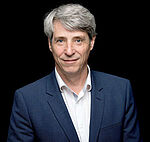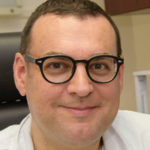Principal Investigators

Inserm researcher and Team Leader.
Vincent Prevot's research focuses on systems neuroscience and neuroendocrinology, particularly the brain circuits that control reproduction and metabolism and the neural pathways through which they respond to peripheral information.

Dr. Paolo Giacobini, Ph.D.
Inserm researcher and Team Leader.
Expert in developmental neuroscience and neuronal migration. Paolo Giacobini's research focuses on understanding the neuronal control of reproduction and the molecular mechanisms underlying fertility disorders.

Dr. Sébastien Bouret, Ph.D.
CNRS researcher and project manager.
Expert in the neuroendocrinology of obesity. Sébastien’s research focuses on studying the role of the perinatal environment and the neurodevelopmental mechanisms influencing obesity and metabolism throughout life.

CNRS researcher and project manager
Expertise in vascular biology (angiogenesis, endothelial activation, functions and properties of endothelial cells) and in vascular extracellular matrix. Current projects: Biophysical properties of tissues to regulate periphery/brain communication: specific roles of blood

Dr. Alicia Mayeuf-Louchart, Ph.D.
Inserm Researcher & Project Manager, Ph.D.
Expert in developmental biology and metabolism of skeletal muscles and brown adipose tissue. Alicia's research focuses on understanding the formation of brown adipose tissue and skeletal muscles during development and the perinatal period, as well as their circadian and metabolic regulation.

Dr. Bénédicte Dehouck, Ph.D.
Lecturer (University of Artois) and project manager.
Study of the interfaces and communication between the blood and the brain at the level of the medio-basal hypothalamus.

Dr. Marc Baroncini, M.D, Ph.D.
PH in neurosurgery (CHU Lille).
Marc is a neurosurgeon, hospital practitioner at the Lille University Hospital. He is interested in the anatomy of the hypothalamus, hypothalamic control of metabolism and dysregulation in eating disorders. He also deals with surgical pathology of the cerebrospinal fluid.

Dr. Ines Martinez Corral, Ph.D.
Inserm researcher and project manager
Expert in developmental vascular biology, Inés' research explores how the vasculature of the central nervous system (CNS), particularly in circumventricular organs, interacts and communicates with specialized ependymoglial cells, known as tanycytes. Her work aims to uncover the molecular signals that build and maintain precise functional networks between these cells and the vasculature, with the goal of revealing mechanisms that regulate brain-blood exchange and offering potential insights into neurovascular function and therapeutic strategies.

Dr. Ariane Sharif, Ph.D.
Lecturer (University of Lille) and project manager.
Expert in stem and glial cell biology. Ariane's research focuses on the production of new cells in the postnatal hypothalamus, and aims to better understand how this process is regulated and how it participates in the control of reproduction and energy metabolism.

Dr Vincent Florent, M.D, Ph.D.
PH in nutrition (CH Arras)
Vincent is a hospital physician specializing in clinical nutrition, metabolism and eating disorders. He is at the origin of several translational studies, notably on the study of the communication of the hypothalamus with the periphery in humans. He designed an innovative virtual reality therapeutic game program called VERTEXA, aimed at treating eating disorders.

Dr. Konstantina Chachlaki, Ph.D.
CDD researcher; miniNO project
Expert in reproductive neuroendocrinology, with a focus on the role of nitric oxide in brain neurodevelopment and overall physiology. By studying nitric oxide dynamics her research centers on illuminating the vital role of this neuromodulator in key stages of neuroendocrine development, such as minipuberty, influencing fertility, cognition and metabolism. As the scientific coordinator of the European H2020 miniNO project, a translational research initiative aimed at understanding the impact of prematurity on minipuberty and key physiological functions, she contributes in bridging fundamental discoveries with practical applications to improve human health across the lifespan.

